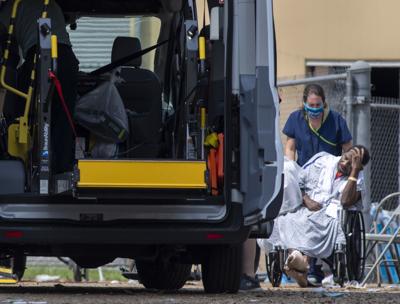The management firms that run Louisiana nursing homes — among other health care companies — could face fewer penalties in court for lapses in patient care including negligence and inadequate staffing under a bill before state lawmakers.
Senate Bill 454 by state Sen. Patrick McMath, R-Covington, sets up a clash between two of the most powerful interests in Louisiana’s Capitol: nursing homes and trial lawyers. The bill would change several definitions in state malpractice law and expand the definition of health care to include administrative duties, staffing and custodial care.
By doing that, it would relegate most nursing home-related lawsuits to the state’s Medical Malpractice Act, which caps the amount plaintiffs can recover and also requires preapproval by a panel of doctors.
The Louisiana Nursing Home Association is backing the bill, saying that, too often, plaintiffs have sued nursing home managers for administrative negligence while also suing for injuries through the Medical Malpractice Act. The claims against management companies can result in multimillion dollar verdicts against nursing homes.
But critics of the bill have dubbed it the “Bob Dean Protection Act,” saying it would mean nursing home patients would lose their ability to recover major verdicts from companies that act in bad faith. The derisive nickname is a nod to nursing home magnate Bob Dean, who sent 843 of his nursing home residents to an ill-equipped warehouse for Hurricane Ida in 2021.
Hundreds of patients later sued Dean’s management company, Louisiana Health Care Consultants, LLC. It resulted in a $12 million settlement.
Attorneys who worked on the Dean lawsuit said if the bill passes, nursing home residents would be unable to bring such a lawsuit against a management company. The residents would be limited to only filing medical malpractice cases.
The Louisiana chapter of the American Association for Retired Persons, which is opposing the bill, described it as a significant step backward.
“The state should not be shielding the nursing home industry from further responsibility, particularly while Louisiana families are still grappling with the tragic nursing home fatalities resulting from Hurricane Ida in 2021,” said Andrew Muhl, AARP’s director of advocacy. “AARP continues to urge authorities and legislators to enact measures that ensure justice and safety for the families impacted by this recent negligence and failure in nursing home care.”
McMath said his first question to the bill drafters was whether it would have affected victims and relatives of people involved in the Dean case.
“The answer was an unequivocal no,” McMath said. “I’m not interested in harming real victims here, but I’m also trying to protect a very important industry in Louisiana.”
'Bob Dean would still be driving his fancy red Ferraris'
Louisiana’s nursing homes have some of the worst outcomes and lowest staffing ratios in the nation, with 60% being rated by federal inspectors as one-star and two-star facilities on a scale of one to five.
Critics of McMath’s bill say it would reinforce the lack of consequences — and legal risk — for such poorly run facilities.
Louisiana would also become the first state among the 29 in the nation with medical malpractice laws to declare that management companies are health care providers, according to attorney Matthew Coman, who represents nursing home patients in elder abuse cases.
“This will have a real tangible impact on the care of the infirm in Louisiana,” Coman said. “If this was the law when Ida hit, Bob Dean would still be driving his fancy red Ferraris around Baton Rouge.”
Coman’s law firm, Garcia & Artigliere, has landed a number of major verdicts against nursing home management companies across the nation, including a $2.2 million judgment last year against a long-term acute care facility in Lafayette. A jury found the management company was responsible for “administrative negligence” in a case where a patient died after developing pressure sores and sepsis.
Mark Berger, executive director of the nursing home association, said Garcia & Artigliere’s lawsuits were a major factor prompting the LNHA to push for the law. He said he disagrees that the bill would make it harder for patients to recover damages against nursing homes, saying there’s still an avenue for them to do so through the Medical Malpractice Act.
Asked directly about how the change to the law would affect patients like Bob Dean’s in the future, Wes Hataway, the LNHA’s legal and policy director said he was not familiar with Dean’s cases.
“We see this as just the return to the original intent of the Medical Malpractice Act,” Hataway said.
Is running over a nursing home patient medical malpractice?
The bill passed out of the Senate Health and Welfare Committee last week and is now scheduled for a vote on the Senate floor. But the committee hearing sparked several disagreements.
State Sen. Jay Luneau, D-Pineville, drew up a hypothetical scenario of what would happen if a nursing home official got into a golf cart to drive to another wing of the building and ran over a resident in the process.
Would that now be a case that could only go through the Medical Malpractice Act?
Troy Broussard, an attorney who defends nursing homes, told Lunaeu that riding a golf cart wouldn’t be part of administration of policies and procedures.
“You’re willing to say that here, under oath today, and you wouldn’t raise that as a defense in a court case?” Luneau asked. “You know you would, and I know you would.”
Former state Sen. John Milkovich, D-Shreveport, also testified against the bill, questioning how much money from nursing homes legislators had accepted and their willingness to protect them instead of pushing for laws that demand better care.
“Who’s going to speak up for these elderly citizens dying of neglect and loneliness in nursing homes who are not lobbyists and not PACs and not special interests?” he asked.

